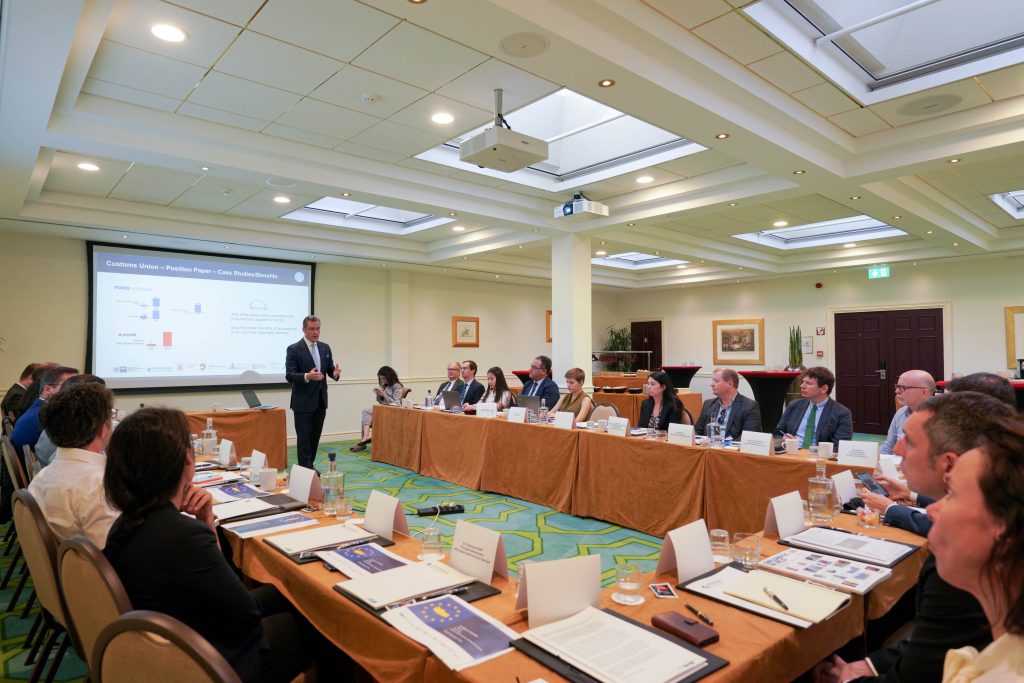Recently, Türkiye and the EU have both agreed that their Customs Union (CU), which has played a concrete role in enhancing their relations, requires a comprehensive modernisation. To this end, a Delegation of European Chambers of Commerce Presidents met with European Union legislators and influential stakeholders to discuss business cooperation between the European Union and Türkiye, in Brussels on 6 September.
In the wake of global events, there are enormous challenges for the European business sector. The immediate economic ramifications of the Russian invasion in Ukraine, the recovery from the shutdowns stemming from the coronavirus pandemic and the continued geopolitical and competitive threats from China.
European companies and their representations, now more than ever, need to keep a close eye on European legislation and market trends. This is particularly relevant in the fields of big data, the boom in e-commerce, remote workers and the move to greener, more sustainable manufacturing and supply chain processes.
There is a new momentum in the European business sector that is constantly reshaping, with innovative practises, increased digitalisation as well as innovative and best practises. Consequently, the European Union, national governments, international organisations and decision-makers are looking for ways to facilitate and enhance trade flows between countries to create supply chain resilience and adhere to the ambitious sustainability goals.
All the institutions here today work on the same objective, which is to strengthen the diplomatic relations between Türkiye and the EU. We work together to stimulate trade and to facilitate networking. We hope that this visit will create a solid basis for future dialogue.
Veronique van Haaften, Secretary, Bilateral European Chambers of Commerce and Industry in Türkiye
Dr Markus Christian Slevogt, President of the German-Turkish Chamber of Industry and Commerce (AHK Türkiye) started the meeting by presenting a joint position paper assessing the benefits and impact of a modernised CU between the two blocs.
The paper highlights how the CU, which was created 25 years ago, is becoming outdated and needs to be updates to the changing times. “We didn’t even have internet when the Customs Union was implemented”, Dr Slevogt pointed out.
We believe that this country, as it is, is substantially undervalued. People who want to take advantage of an undervalues asset need to position themselves early and anti-cyclical.
Dr Markus Christian Slevogt, President of the German-Turkish Chamber of Industry and Commerce

New factors need to be taken into consideration and included in the CU, such as e-commerce, services and the strong agricultural field in Türkiye. Moreover, geostrategic needs, like the pandemic and war in Ukraine have shown that “the value chain built around Asian countries, be it China or Vietnam, needs to be taken closer to Europe”, Dr Slevogt continued. “Assets coming from China and the US take 2, 3, 4 months, Türkiye could be a closer supplier”, Franck Mereyde, President of the French Chamber of Commerce in Istanbul, added.
The same point was made by Livio Manzini, President of the Italian Chamber of Commerce in Istanbul, who remined the room that the first trade agreement the UK made after Brexit was with Türkiye. It only took a few weeks to negotiate, not years. The US Trade Department also had a lengthy meeting in the country which concluded with a trade agreement. The EU should realise the moment to enhance economic ties with Türkiye is now.
We are missing the train! The US is taking it, the UK is taking it, the EU is missing out.
Livio Manzini, President of the Italian Chamber of Commerce in Istanbul

Furthermore, as of June 2020, more than 5 million people are working in agriculture in Türkiye, which is 19% of the total employment in Türkiye and 4% of total employment in the EU. The country has the potential to replace Russia and Ukraine, or at least heavily aid, in providing agricultural goods to the EU, but it has one of the highest tariff rates on agricultural products among OECD countries.
Regarding the EU standards for business, like the contents of the EDG, Dr Slevogt indicated that the companies investing in Tukey are still respecting the standards of their mother companies. “Spill-over I think is the best term for this, when you are entering certain production sites in Türkiye”, he said, adding that foreign investors are also pushing very hard for digitalisation.
Not only digitalisation, but the private sector is also pushing very hard for CO2 taxation. Türkiye is ready to step up to the standards of the investors, with the collaboration of the EU I think Türkiye can overcome all these challenges.
Nevzat Tuğrul Şeremet, President of the Belgian/Luxemburg Chamber of Commerce in Istanbul
Lastly, Mr Mereyde stressed that although the CU was started in the context of Türkiye joining the EU, now they should be approached as completely separate issues.
Improving the Customs Union is not a tool for joining the EU. Our aim is only to improve business. And business is not only money, it is also people.
Franck Mereyde, President of the French Chamber of Commerce in Istanbul

“If we improve the Customs Union, we have more people working for EU and Turkish companies. These companies have to bring the same values between the EU and Türkiye, which requires a delicate balance. Again, we are here for the Customs Union, not EU membership. This will create a better understanding between the EU and Türkiye”, he concluded.












